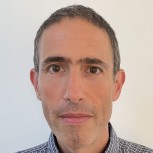
Professor of Engineering
Academic Division: Information Engineering
Research group: Machine Intelligence
Telephone: +44 1223 3 32750
Email: ahg@eng.cam.ac.uk
Research interests
Professor Gee's research involves the application of information engineering to topics in medical science, paleoanthropology and clinical practice. Currently, he is working on aspects of surface registration, shape analysis and cortical bone mapping using deconvolved CT.
A unifying theme is close collaboration with paleoanthropologists and clinicians, and the implementation of research tools in robust software that is suitable for use in clinical environments. Professor Gee is one of the authors of the Stradview software suite, supporting ultrasound and CT research teams around the world.
Strategic themes
Bioengineering
Shape analysis, surface registration, studying the osseous cortex using deconvolved CT and statistical parametric mapping.
Research projects
Historical projects include elastography (EPSRC, Wellcome Trust), ultrasound deconvolution (EPSRC) and 3D ultrasound (EPSRC). More recent projects, studying osteoporosis with CT, were sponsored by Eli Lilly and Amgen.
Teaching activity
Medical imaging, computer graphics, computer architecture, machine tools, 4th year projects, Lego.
Other positions
Director of Studies in Engineering and Financial Tutor, Queens' College
Biography
Andrew Gee obtained a BA in Electrical and Information Science at Cambridge University in 1990. He was awarded the PhD degree in 1993 from the same university for his thesis on the use of feedback neural networks for combinatorial optimization. In 1993 he was appointed to a Research Fellowship at Queens' College, Cambridge, where he started to work on computer vision. In October 1995 he became an Assistant Lecturer in Information Engineering and an Official Fellow of Queens' College, where he is now Director of Studies in Engineering. He was promoted to the post of Lecturer in January 1998, Senior Lecturer in October 2001 and Reader in October 2006. He teaches undergraduate courses in all aspects of computing: in 1998 he was awarded a Pilkington Prize by the Trustees of the Cambridge Foundation for excellence in teaching at the University of Cambridge. He has worked in a number of research areas, including medical imaging, computer vision, document image processing and neural networks. Currently, he is working on aspects of surface registration, shape analysis and cortical bone mapping using deconvolved CT. He has authored and co-authored around 190 papers.
